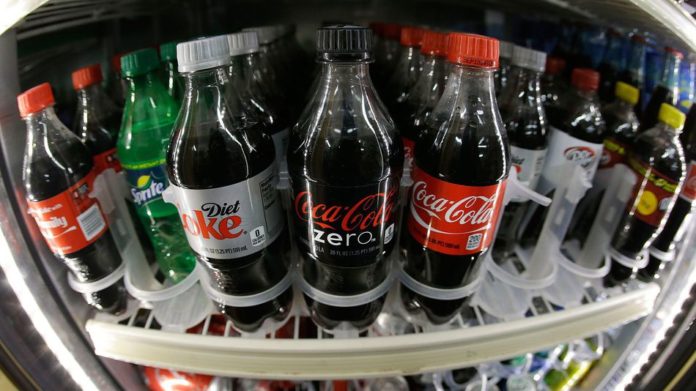 In this photo taken with a fisheye lens, a shelf of soft drinks are shown in a refrigerator at K & D Market in San Francisco, Wednesday, Oct. 1, 2014. A tax on sodas and other sugar-laden drinks that voters and courts in other parts of the country have rejected is on the November ballots in San Francisco and Berkeley, two cities that have been open to such social-engineering initiatives in the past.
In this photo taken with a fisheye lens, a shelf of soft drinks are shown in a refrigerator at K & D Market in San Francisco, Wednesday, Oct. 1, 2014. A tax on sodas and other sugar-laden drinks that voters and courts in other parts of the country have rejected is on the November ballots in San Francisco and Berkeley, two cities that have been open to such social-engineering initiatives in the past.
Residents of Berkeley, California, made history on Tuesday by passing the nation’s first tax on soda and other sugary beverages, despite millions of dollars spent by the soda industry in an effort to defeat it.
A similar proposal across the bay in San Francisco fell short of the two-thirds majority it needed to pass with about 55% of voters in favor. Berkeley’s tax required a simple majority and got about three-quarters of the vote.
The new measure will levy a penny-per-ounce tax on any non-alcoholic beverages with added sweeteners and more than two calories per ounce. That includes non-diet soda, energy drinks, sports drinks and sweetened ice tea but not milk products, meal replacement drinks or instant formula.
55% of voters supported SF soda tax. While we didn’t reach 2/3, majority said yes despite $10M in corporate spending: http://t.co/LyrGkb0XRW
— Scott Wiener (@Scott_Wiener) November 5, 2014
While proposed soda taxes in more than 30 cities and states across the United States have been shut down by voters, many were hopeful that Berkeley, a city famous for its progressive politics, could be the first. The city has led the way in other social movements that later became nationwide norms, such as curbside recycling, smoke-free public spaces and public school food policies.
The tax’s supporters claim it will help curb obesity, diabetes and other health problems linked to the consumption of soft drinks. They compare the new tax to other “sin taxes” that target alcohol and cigarettes and hope that other U.S. cities will follow Berkeley’s lead.
“Many communities have the same ingredients that made Measure D possible in Berkeley: proactive parents and community leaders who care about the health of their kids,” campaign co-chair Vicki Alexander said in a statement.
The American Beverage Association, an industry group that includes Coca-Cola Co. and Pepsi Co., spent about $2.4 million to defeat the tax in Berkeley and $9.1 million in San Francisco, according to Roger Salazar, a spokesperson for both efforts to defeat the taxes.
Salazar said soda tax proponents should not be so quick to herald Berkeley as a trendsetter.
“Soda tax activists have been venue shopping for more than five years,” Salazar said in a statement. “Berkeley was low-hanging fruit, and doesn’t look like mainstream America. If politicians want to stake their reputations on what Berkeley did, they do so at their own risk.”
More than half of the funds raised in support of the tax came from former New York City Mayor Michael Bloomberg. The rest came from national organizations like the American Heart Association and Center For Science in the Public Interest, local health professionals and medical centers and other private donations.
Mexico placed a similar tax on soft drinks this year, and reports show that it has led to a decrease in consumption. Various studies show that higher soda prices do mean lower soda consumption — though not necessarily less obesity.
Berkeley’s tax goes into effect on January 1, 2015.
